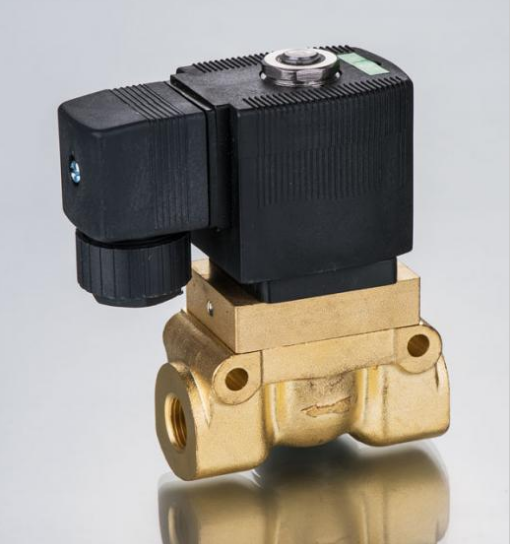In the vast landscape of pneumatic systems, the solenoid valve emerges as a linchpin, championing efficiency, precision, and adaptability. This article elucidates the unique nature of the solenoid valve, the myriad benefits it offers, its limitations, and where we often encounter them in our daily lives.
What is a solenoid valve?
A solenoid valve is an electromechanical device that harnesses the principles of electromagnetism to control the flow of a fluid or gas. When we talk about its basic structure, the solenoid valve consists of a coil of wire wrapped around a metal core. When an electric current passes through this coil, it creates a magnetic field, which in turn moves a plunger or similar mechanism to open or close the valve. This allows the solenoid valve to swiftly and precisely regulate the flow of the medium—be it liquid or gas—without requiring manual intervention.
The ability to operate remotely and respond to electrical signals makes the solenoid valve a vital component in a myriad of applications, from simple household appliances to complex industrial systems. Its function isn't merely limited to "on" or "off" operations; depending on the design and configuration, solenoid valves can also facilitate proportional flow control, ensuring that the right amount of fluid or gas is delivered at the right time.
Their adaptability, combined with their capacity to function effectively in both high-pressure and low-pressure environments, ensures that solenoid valves remain an integral element in pneumatic and hydraulic systems worldwide.
Choosing the Right Solenoid Valve
Selecting the appropriate solenoid valve is pivotal for efficient and safe operations. Factors to consider include the type of fluid or gas being controlled, the desired flow rate, operating pressure, and the environment in which the valve will be used. By matching these requirements with the valve's specifications and understanding its response to electrical signals, one can ensure optimal performance and longevity in its intended application.
What are the advantages of solenoid valves?
- Rapid Response: Solenoid valves are known for their quick actuation. As they operate based on electrical signals, the transition from the closed to open state (or vice versa) is almost instantaneous, ensuring timely control of fluid or gas flow.
- Remote Operation: Due to their electromechanical nature, solenoid valves can be controlled remotely, making them ideal for hard-to-reach or hazardous locations where manual valve operation would be challenging or unsafe.
- Compact Design: Many solenoid valves boast a compact form factor, making them suitable for applications with space constraints. Despite their small size, they can handle efficient flow control.
- Precision: Solenoid valves offer precise flow control. They can be calibrated to allow exact amounts of fluid or gas to pass, essential for applications requiring meticulous regulation.
- Versatility: These valves are adaptable and can be used with a wide range of fluids and gases, from water to corrosive chemicals. Their construction materials can be selected based on the medium they will control, ensuring long-lasting performance.
- Low Power Consumption: Modern solenoid valves are designed to be energy efficient. Some variants, like latching solenoid valves, use power only during the state change and none while maintaining their position, saving on energy costs.
- Safety: Solenoid valves enhance safety in systems. In the event of power failure, they can be designed to either stay in their last position or revert to a default safe position (e.g., closed).
- Integration with Automation Systems: Being electrically operated, solenoid valves can be easily integrated into automated setups. They can be controlled via computer systems, PLCs, or other electronic controllers, making them fit for modern industrial automation.
What are the uses of solenoids?
Solenoid valves, with their robust and adaptable design, find applications across a multitude of sectors. In domestic environments, they are essential components in washing machines and dishwashers, controlling the flow of water with precision. Within the industrial realm, they play a pivotal role in automating processes; for instance, in the petrochemical industry, they ensure safe and efficient flow control of volatile substances. Medical devices like ventilators rely on solenoid valves for accurate delivery of air or gases, which can be life-saving in critical situations. Automotive industries utilize solenoids in various systems, from fuel injection to automatic door locks. Even in agriculture, solenoid valves aid in precise irrigation, ensuring crops receive the right amount of water. This breadth of application is a testament to their versatility, efficiency, and reliability.
The prominence of solenoid valves in today's technological landscape is undeniable. Their ability to offer precise, rapid, and remote-controlled operation gives them an edge over traditional mechanical valves. While they come with their own set of challenges, the myriad applications across industries underscore their indispensability.
As technology continually advances, solenoid valves stand out due to their adaptability and precision, ensuring their place at the forefront of fluid and gas control solutions. Whether you're operating within a cutting-edge industry or merely utilizing household appliances, the discreet and effective operation of solenoid valves significantly enhances the efficiency and safety of our daily lives. For more detailed insights or assistance with solenoid valve solutions, don't hesitate to contact us at Hakpneumatic.com.

